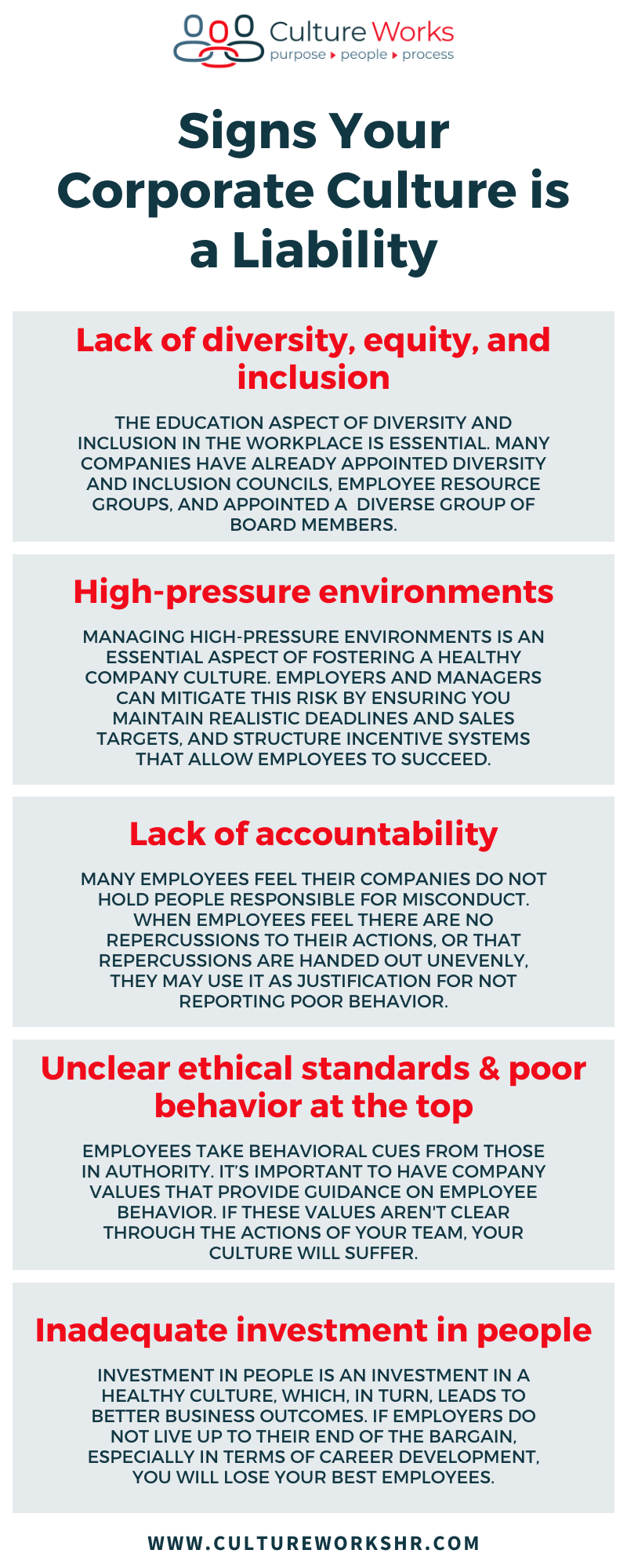Signs Your Corporate Culture is a Liability
The importance of company culture is not always explicitly stated. Some believe that the importance of corporate culture can only be stated anecdotally. However, there is plenty of evidence in support of companies investing in bettering their culture.
In a study performed by Harvard Business School Professor, John Kotter, he concluded that “organizations with rich, healthy cultures achieved net income growth of 756%, versus a mere one percent for those with less-defined cultures.” Watson Wyatt also performed research to develop the Human Capital Index and found that companies with superior scores of five key people practices had a 30% higher market value than other organizations.
That being said, companies who pay more attention to the development of a successful company culture will be rewarded financially through growth and value. These companies are viewed through a more desirable lens, so they are able to attract talent that helps generate more income, growth, and value.
The increased requirement for transparency through the adoption of social media, scrutiny of investors, and all-around activism for social issues has ensured companies are held accountable for the culture they cultivate. As a business owner, it’s important to ask yourself what areas of your culture may be putting you at risk.
There are a few key areas of risk that you should address when answering this question.
Lack of diversity, equity, and inclusion
Over the past few years, corporate culture has continuously been called out for lack of inclusion, diversity, and equality. With a misrepresentation of people of color, gender discrimination, and sexual harassment triggering these call-outs, it’s important that your company represents diversity at all levels. But it doesn’t stop there.
The educational aspect of diversity and inclusion in the workplace is essential as well. Many companies have already appointed diversity and inclusion councils, employee resource groups, and appointed diverse members to their boards. Employers who make an effort to fix unhealthy norms and behaviors in the work environment are more likely to retain their top employees. As an employer, diversity and inclusion education should be a top priority moving forward.
High-pressure environments
Managing high-pressure environments is an essential aspect of fostering a healthy company culture. Employers and managers can mitigate this risk by ensuring you maintain realistic deadlines and sales targets, and structure incentive systems that encourage employee success.
This is one area where employees often express a desire for improvement to their employers. In order to help your employees succeed you should regulate the burdens placed upon them. You can also provide services that help them build resilience, such as on-site support services during busy seasons.
Another way to support your employees is through appointing ‘wellness officers’ whose responsibility it is to attend to employees’ emotional and physical wellbeing. These ‘wellness officers’ can provide training that builds a framework that supports ethical decision-making in high-stakes environments. They can also provide training on mindfulness practices, breathing techniques to mitigate stress, and other ways to ensure that mental health remains a top priority.
Lack of accountability
One critical aspect of a high-functioning culture is accountability. Many employees feel their companies do not hold people responsible for misconduct. When employees feel there are no repercussions to their actions, or that repercussions are handled unfairly, they may use it as justification for not reporting poor behavior.
The collective cultural stewardship ‘see something, say something’ begins to fall when a company’s commitment to its values begins to fall by the wayside.
In order to improve in this area, companies have adopted whistleblower policies that ensure anonymity when reporting poor behavior. It’s important to humanize your human resources team in order for employees to feel comfortable coming to them with issues. Human resources can also help to provide training that demystifies the reporting and investigation process. These training topics, along with the friendly interactions between employees and human resources, allow employees’ fear to transform into trust in the company and its commitment to integrity.
Unclear ethical standards
It’s important to have company values that provide guidance on employee behavior. If these values do not exist, are unknown, or aren’t enabled by systems and processes, your culture will likely suffer. If employees do not know these values and don’t feel confident in explaining them, they will not know how to implement them.
This begins in the hiring process. Employee value alignment is essential in building a company culture that thrives. Our assessments help ensure all candidates are value and role aligned within your organization.
Role and value alignment increase employee engagement. We wholeheartedly believe that role-aligned employees stay in their jobs.
Another aspect of improving unclear ethical standards within your organization is by assigning culture ambassadors, implementing quarterly value reviews, and ensuring communication is consistently values-driven.
Inadequate investment in people
Investment in people is an investment in a healthy culture, which in turn leads to better business outcomes as illustrated above. At Culture Works, we believe employees joining a company enter into a deal including compensation, career development, and benefits in exchange for their work.
If employers do not live up to their end of the bargain, especially in terms of career development, you run the risk of losing your best employees. Human resources can partner with communications teams to define employee value propositions that help employees understand what’s in it for them. Show your employees you care and support them in everything they do.
Poor behavior at the top
Employees take behavioral cues from those in authority. If your company leaders are exhibiting poor behavior, it will likely seep into the rest of your company. We understand that executives are under great pressure to deliver results, however, it’s important that they achieve those results in an ethical manner. Executives must behave in ways that align with the company’s values.
If your CEO, CFO, COO, CMO, or any other C-suite employee does not act in an ethical manner, the rest of your company may suffer as a result. Recently, we’ve been seeing a growing number of C-suite executives step down due to ethical pitfalls. According to PWC, 39% of CEOs who left their jobs in 2018 left for “reasons related to unethical behaviors stemming from allegations of sexual misconduct or ethical lapses connected to things like fraud, bribery, and insider trading.”
It’s important to put the values of your company above all else. Values are the foundation of healthy company culture.
At Culture Works, our mission is to create an intentional, collaborative, and healthy culture for businesses in order to facilitate organizational change. We partner with your team to create a value-driven culture that increases productivity and reduces churn. Contact us today to see how we can help your unique business.












